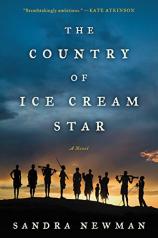The Country of Ice Cream Star
Review
The Country of Ice Cream Star
As an avid reader of young adult literature, I've read (possibly more than) my fair share of post-apocalyptic fiction. Zombies and asteroids are all well and good, but to me the most terrifying are novels like Emily St. John Mandel's STATION ELEVEN, Carla Buckley's THE THINGS THAT KEEP US HERE, and now Sandra Newman's THE COUNTRY OF ICE CREAM STAR. In all these books, the precipitating event is a seemingly simple but rampantly contagious virus that abruptly changes human life forever --- a scenario that is just plausible enough to be truly unsettling.
THE COUNTRY OF ICE CREAM STAR takes place 85 years after a mysterious illness has wiped out much of the world's population. The virus appears to persist, however --- virtually no one survives past the age of 18 or 19 without succumbing to a deadly illness called "posey." The result, in the remnants of the United States, anyway, is a society ruled by teenagers, in which young people (all of whom have black skin) fight wars as children, are eligible to take on leadership positions shortly after they reach sexual maturity --- and then die a year or two later. The intensity of such a condensed life is something that is difficult to imagine, but fortunately Sandra Newman does so for us.
"Although it's hardly the only reason to remember and appreciate THE COUNTRY OF ICE CREAM STAR, perhaps the most immediately distinctive aspect of the book is its novel use of language."
Ice Cream Fifteen Star (each of the people in Ice Cream's tribe includes their age in their name) is one of those people poised to become a leader. Her older brother, Driver, is sergeant of the Sengle tribe in central Massachusetts, but when he begins to show symptoms of the posey, Ice Cream seizes control. Her Sengles --- to whom she is fiercely loyal --- are in a state of constant conflict and/or negotiation with several other area tribes, including the Lowells (known for their dedication to work and order), the Christings (a pious quasi-Christian sect that practices polygamy) and the Nat Mass Armies (a warlike group that keeps slaves).
When Ice Cream encounters a white man (a "roo," as she calls him) and learns that he (named Pasha) may be as old as 30, she becomes intent on discovering the secret of his relative longevity and, eventually, to follow Pasha to what may be a cure for the disease that would otherwise kill not only Driver but, before too long, Ice Cream herself. Their journey takes them to New York City (which has been claimed by a Catholic sect focused on their cult of Mary) and Washington, DC, where a particularly militaristic tribe views the National Mall as sacred ground and has littered surrounding areas with countless land mines to protect these historic sites.
Ice Cream is a fascinating character --- fearless, self-confident, politically savvy and brimming with bravado. She also is reluctant to give herself over to love even when she clearly feels it; as a potential leader of her people, she knows that the allegiances of her heart are every bit as fraught as any political alliances she might make.
Although it's hardly the only reason to remember and appreciate THE COUNTRY OF ICE CREAM STAR, perhaps the most immediately distinctive aspect of the book is its novel use of language. As Russell Hoban did in his post-apocalyptic novel, RIDDLEY WALKER, Newman imagines not only how society would change in the wake of a cataclysmic event, but also how language would evolve --- in this case, quickly and drastically.
Newman imagines a slightly different dialect for each of the societies she imagines; Ice Cream's language is a patois inspired in large part from the colloquial speech of present-day African Americans, but also taking as its inspiration the teenager's tendency to cut corners wherever possible. The result is a form of English that borrows from several other languages while preserving some rhythm and unexpected poetry of its own: "My foot know every hill and stumbling hollow of this walk. Know where the owl will hoo, and where the rusten bicycle been left. But now my townie woods become a temporary place, a picture where some past life been. I walk through memories gone."
For many reasons, including both her singular voice and her personality, readers won't soon forget Ice Cream Fifteen Star.
Reviewed by Norah Piehl on February 13, 2015




